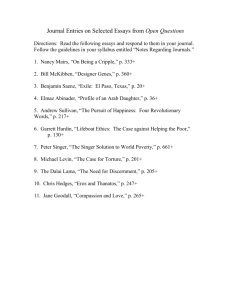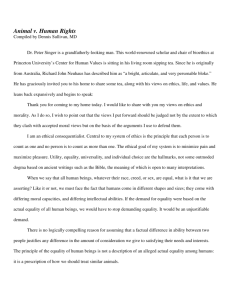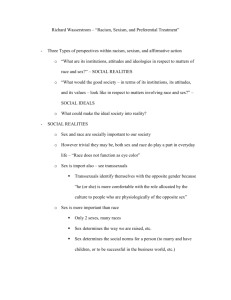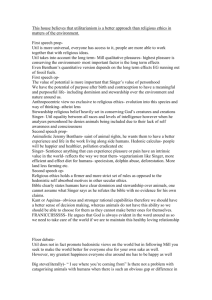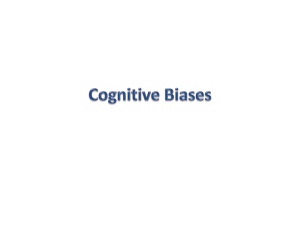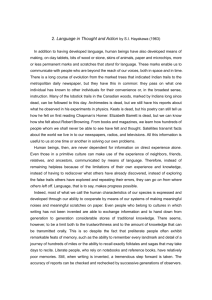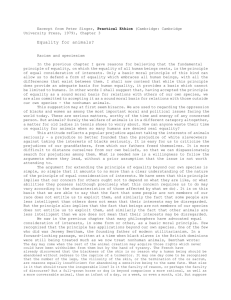1 Phil 108, Tuesday, October 23 Singer: What May We Do to
advertisement
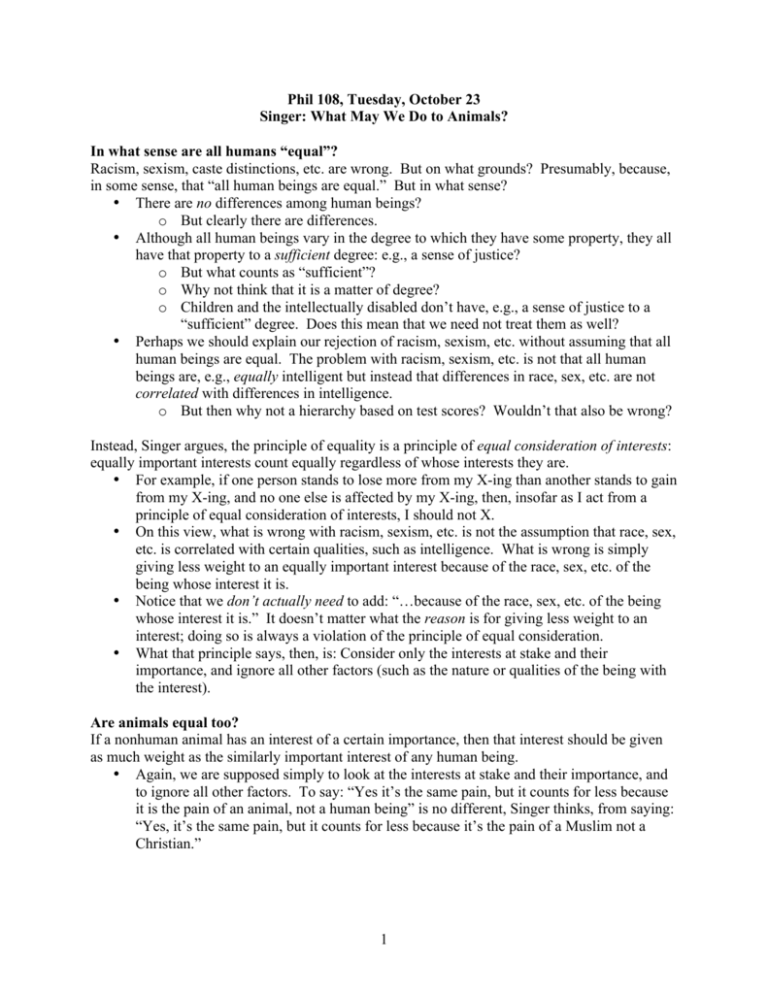
Phil 108, Tuesday, October 23 Singer: What May We Do to Animals? In what sense are all humans “equal”? Racism, sexism, caste distinctions, etc. are wrong. But on what grounds? Presumably, because, in some sense, that “all human beings are equal.” But in what sense? • There are no differences among human beings? o But clearly there are differences. • Although all human beings vary in the degree to which they have some property, they all have that property to a sufficient degree: e.g., a sense of justice? o But what counts as “sufficient”? o Why not think that it is a matter of degree? o Children and the intellectually disabled don’t have, e.g., a sense of justice to a “sufficient” degree. Does this mean that we need not treat them as well? • Perhaps we should explain our rejection of racism, sexism, etc. without assuming that all human beings are equal. The problem with racism, sexism, etc. is not that all human beings are, e.g., equally intelligent but instead that differences in race, sex, etc. are not correlated with differences in intelligence. o But then why not a hierarchy based on test scores? Wouldn’t that also be wrong? Instead, Singer argues, the principle of equality is a principle of equal consideration of interests: equally important interests count equally regardless of whose interests they are. • For example, if one person stands to lose more from my X-ing than another stands to gain from my X-ing, and no one else is affected by my X-ing, then, insofar as I act from a principle of equal consideration of interests, I should not X. • On this view, what is wrong with racism, sexism, etc. is not the assumption that race, sex, etc. is correlated with certain qualities, such as intelligence. What is wrong is simply giving less weight to an equally important interest because of the race, sex, etc. of the being whose interest it is. • Notice that we don’t actually need to add: “…because of the race, sex, etc. of the being whose interest it is.” It doesn’t matter what the reason is for giving less weight to an interest; doing so is always a violation of the principle of equal consideration. • What that principle says, then, is: Consider only the interests at stake and their importance, and ignore all other factors (such as the nature or qualities of the being with the interest). Are animals equal too? If a nonhuman animal has an interest of a certain importance, then that interest should be given as much weight as the similarly important interest of any human being. • Again, we are supposed simply to look at the interests at stake and their importance, and to ignore all other factors. To say: “Yes it’s the same pain, but it counts for less because it is the pain of an animal, not a human being” is no different, Singer thinks, from saying: “Yes, it’s the same pain, but it counts for less because it’s the pain of a Muslim not a Christian.” 1 • “The argument for extending the principle of equality beyond our own species is simple. It amounts to no more than a clear understanding of the principle of equal consideration of interests.” What, if anything, is wrong with eating animal products: e.g., meat, eggs, dairy? Two basic answers: 1. It (i) directly causes or (ii) participates in a collective behavior that causes animals to suffer that would not otherwise. Animal suffering (of a certain degree) matters—indeed, just as much as human suffering (of that degree). 2. It (i) directly causes or (ii) participates in a collective behavior that causes animals to die that would not otherwise. Why is causing the death of an animal bad? More on this below… And it does not serve any similarly important human interests (e.g., we don’t need it for our health, we only like the taste). Does producing animal products for human consumption directly cause animals to suffer? • Factory farming, which involves, e.g., extreme confinement, certainly directly causes animals to suffer. • But what about “free range” cattle and poultry? Still typically involves castration, branding, separation of mother and young, etc. Does producing animal products for human consumption directly cause animals to die? • Only in the production of meat? • Not necessarily: E.g., male chicks may be killed, because they will not lay eggs; male calves of dairy cows may be killed. Does consuming animal products increase the production of animal products? “To buy the results of this process of production is to support it and encourage producers to continue to do it.” • But perhaps my refraining from consuming animal products won’t make any difference to how much production there is. • In that case, might there still be something wrong about participating in the collective behavior? Is it wrong to kill nonhuman animals? Some nonhuman animals may be persons: have the ability to communicate, self-awareness, expectations and desires for the future. E.g., chimpanzees, gorillas, bonobos. Recall Singer’s argument from a few weeks back: If there is something specially wrong about killing human beings, it is because human beings are persons. E.g., it thwarts their preferences for the future, does not respect their autonomous decision-making. But then killing nonhuman persons is specially wrong in the same way. What about nonhuman animals that are not persons? Hedonistic Total View: It is wrong because we are reducing the amount of pleasure in the world. Problem: Why not kill humans to make room for more, happier animals? 2 Hedonistic Prior Existence View: It is wrong because we are depriving the animal of the pleasure that it would have experienced. Problem: Why is it wrong to bring a miserable person into existence? Why is it wrong not wait in order to bring a different, happier child into existence? Singer’s hybrid response: 1. Total View for pleasures (=Hedonistic Total View) • Or, more broadly, some intrinsic value that doesn’t depend on preferences (e.g., friendship, knowledge, etc.) + 2. Prior Existence View for preferences. A preference is a “debit” in the moral ledger. Satisfying it cancels the debt, but creating it and then satisfying it achieves nothing. • This would explain why we shouldn’t bring a miserable child into existence, since it would have preferences (e.g., to be free from pain) that wouldn’t be satisfied. • But why then should we bring even a happy child into existence, which is bound to have some unsatisfied preference? This is why we also need the Total View… If we accept the Total View about pleasure, then we can give the replaceability argument. Although animal farming kills animals, it also creates new animals. In that case, the total pleasure isn’t reduced. Moreover, if the animals that we kill have no preference for further life (because they have no conception of their future), then we don’t need to keep them alive to “cancel to debt,” even on Singer’s hybrid view. Reply: According to the Total View, shouldn’t we use resources in whatever way will support the most pleasure-feeling beings, which means mostly growing plants? Isn’t there still an argument, therefore, against animal farming? Review Questions: 1. “If you must slap some animal, you should slap a horse, not a human, because horsehide is less sensitive than human skin.” Is this view “speciesist”: i.e., incompatible with the principle of equal consideration of interests? 2. At p. 107, Singer imagines an “organ banking” system in which clones, with the mental life of infants, are reared in pain-free conditions in order to have substitute organs available for transplant. To what purpose does he put this example? According to his hybrid view, would this system be wrong? 3
